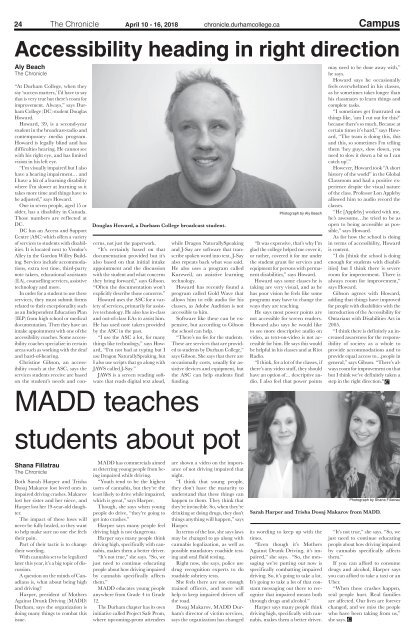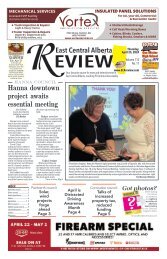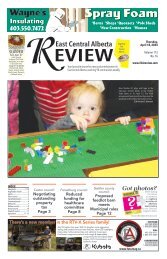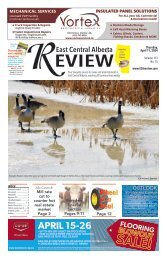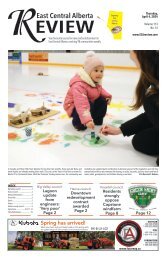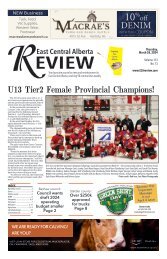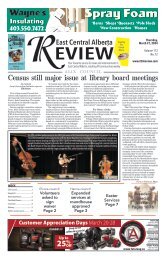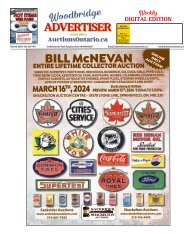Durham Chronicle Volume XLIV, Issue 11
Durham Chronicle Volume XLIV, Issue 11
Durham Chronicle Volume XLIV, Issue 11
You also want an ePaper? Increase the reach of your titles
YUMPU automatically turns print PDFs into web optimized ePapers that Google loves.
24 The <strong>Chronicle</strong> April 10 - 16, 2018 chronicle.durhamcollege.ca Campus<br />
Accessibility heading in right direction<br />
Aly Beach<br />
The <strong>Chronicle</strong><br />
Douglas Howard, a <strong>Durham</strong> College broadcast student.<br />
“At <strong>Durham</strong> College, when they<br />
say ‘success matters,’ I’d have to say<br />
that is very true but there’s room for<br />
improvement. Always,” says <strong>Durham</strong><br />
College (DC) student Douglas<br />
Howard.<br />
Howard, 39, is a second-year<br />
student in the broadcast-radio and<br />
contemporary media program.<br />
Howard is legally blind and has<br />
difficulties hearing. He cannot see<br />
with his right eye, and has limited<br />
vision in his left eye.<br />
“I’m visually impaired but I also<br />
have a hearing impairment… and<br />
I have a bit of a learning disability<br />
where I’m slower at learning so it<br />
takes more time and things have to<br />
be adjusted,” says Howard.<br />
One in seven people, aged 15 or<br />
older, has a disability in Canada.<br />
Those numbers are reflected at<br />
DC.<br />
DC has an Access and Support<br />
Centre (ASC) which offers a variety<br />
of services to students with disabilities.<br />
It is located next to Vendor’s<br />
Alley in the Gordon Willey Building.<br />
Services include accommodations,<br />
extra test time, third-party<br />
note takers, educational assistants<br />
(EA), counselling services, assistive<br />
technology and more.<br />
In order for a student to use these<br />
services, they must submit forms<br />
related to their exceptionality such<br />
as an Independent Education Plan<br />
(IEP) from high school or medical<br />
documentation. Then they have an<br />
intake appointment with one of the<br />
accessibility coaches. Some accessibility<br />
coaches specialize in certain<br />
areas such as working with the deaf<br />
and hard-of-hearing.<br />
Christine Gibson, an accessibility<br />
coach at the ASC, says the<br />
services students receive are based<br />
on the student’s needs and concerns,<br />
not just the paperwork.<br />
“It’s certainly based on that<br />
documentation provided but it’s<br />
also based on that initial intake<br />
appointment and the discussion<br />
with the student and what concerns<br />
they bring forward,” says Gibson.<br />
“Often the documentation won’t<br />
explicitly describe those concerns.”<br />
Howard uses the ASC for a variety<br />
of services, primarily for assistive<br />
technology. He also has in-class<br />
and out-of-class EAs to assist him.<br />
He has used note takers provided<br />
by the ASC in the past.<br />
“I use the ASC a lot, for many<br />
things like technology,” says Howard,<br />
“I’m not bad at typing but I<br />
use Dragon NaturallySpeaking, but<br />
I also use scripts that go along with<br />
JAWS called J-Say.”<br />
JAWS is a screen reading software<br />
that reads digital text aloud,<br />
while Dragon NaturallySpeaking<br />
and J-Say are software that transcribe<br />
spoken word into text. J-Say<br />
also repeats back what was said.<br />
He also uses a program called<br />
Kurzweil, an assistive learning<br />
technology.<br />
Howard has recently found a<br />
program called Gold Wave that<br />
allows him to edit audio for his<br />
classes, as Adobe Audition is not<br />
accessible to him.<br />
Software like these can be expensive,<br />
but according to Gibson<br />
the school can help.<br />
“There’s no fee for the students.<br />
These are services that are provided<br />
to students by <strong>Durham</strong> College,”<br />
says Gibson. She says that there are<br />
occasionally costs, usually for assistive<br />
devices and equipment, but<br />
the ASC can help students find<br />
funding.<br />
Photograph by Aly Beach<br />
“It was expensive, that’s why I’m<br />
glad the college helped me cover it,<br />
or rather, covered it for me under<br />
the student grant for services and<br />
equipment for persons with permanent<br />
disabilities,” says Howard.<br />
Howard says some classes he is<br />
taking are very visual, and as he<br />
has poor vision he feels like some<br />
programs may have to change the<br />
ways they are teaching.<br />
He says most power points are<br />
not accessible for screen readers.<br />
Howard also says he would like<br />
to see more descriptive audio on<br />
video, as text-on-video is not accessible<br />
for him. He says this would<br />
be helpful in his classes and at Riot<br />
Radio.<br />
“I think, for a lot of the classes, if<br />
there’s any video stuff, they should<br />
have an option of… descriptive audio.<br />
I also feel that power points<br />
may need to be done away with,”<br />
he says.<br />
Howard says he occasionally<br />
feels overwhelmed in his classes,<br />
as he sometimes takes longer than<br />
his classmates to learn things and<br />
complete tasks.<br />
“I sometimes get frustrated on<br />
things like, ‘am I cut out for this?’<br />
because there’s so much. Because at<br />
certain times it’s hard,” says Howard,<br />
“The team is doing this, this<br />
and this, so sometimes I’m telling<br />
them ‘hey guys, slow down, you<br />
need to slow it down a bit so I can<br />
catch up’.”<br />
However, Howard took “A short<br />
history of the world” in the Global<br />
Classroom and had a positive experience<br />
despite the visual nature<br />
of the class. Professor Lon Appleby<br />
allowed him to audio record the<br />
classes.<br />
“He [Appleby] worked with me,<br />
he’s awesome…he tried to be as<br />
open to being accessible as possible,”<br />
says Howard.<br />
As for how the school is doing<br />
in terms of accessibility, Howard<br />
is content.<br />
“I do [think the school is doing<br />
enough for students with disabilities]<br />
but I think there is severe<br />
room for improvement. There is<br />
always room for improvement,”<br />
says Howard.<br />
Gibson agrees with Howard,<br />
adding that things have improved<br />
for people with disabilities with the<br />
introduction of the Accessibility for<br />
Ontarians with Disabilities Act in<br />
2005.<br />
“I think there is definitely an increased<br />
awareness for the responsibility<br />
of society as a whole to<br />
provide accommodations and to<br />
provide equal access to…people in<br />
general,” says Gibson. “There’s always<br />
room for improvement on that<br />
but I think we’ve definitely taken a<br />
step in the right direction."<br />
MADD teaches<br />
students about pot<br />
Shana Fillatrau<br />
The <strong>Chronicle</strong><br />
Both Sarah Harper and Trisha<br />
Dosaj Makarov lost loved ones in<br />
impaired driving crashes. Makarov<br />
lost her sister and her niece, and<br />
Harper lost her 19-year-old daughter.<br />
The impact of these loses will<br />
never be fully healed, so they want<br />
to help make sure no one else feels<br />
their pain.<br />
Part of their tactic is to change<br />
their wording.<br />
With cannabis set to be legalized<br />
later this year, it’s a big topic of discussion.<br />
A question on the minds of Canadians<br />
is, what about being high<br />
and driving?<br />
Harper, president of Mothers<br />
Against Drunk Driving (MADD)<br />
<strong>Durham</strong>, says the organization is<br />
doing many things to combat this<br />
issue.<br />
MADD has commercials aimed<br />
at deterring young people from being<br />
impaired while driving.<br />
“Youth tend to be the highest<br />
users of cannabis, but they’re the<br />
least likely to drive while impaired,<br />
which is great,” says Harper.<br />
Though, she says when young<br />
people do drive, “they’re going to<br />
get into crashes.”<br />
Harper says many people feel<br />
driving high is not dangerous.<br />
Harper says many people think<br />
driving high, specifically with cannabis,<br />
makes them a better driver.<br />
“It’s not true,” she says. “So, we<br />
just need to continue educating<br />
people about how driving impaired<br />
by cannabis specifically affects<br />
them.”<br />
MADD educates young people<br />
anywhere from Grade 4 to Grade<br />
12.<br />
The <strong>Durham</strong> chapter has its own<br />
initiative called Project Safe Prom,<br />
where upcoming-prom attendees<br />
are shown a video on the importance<br />
of not driving impaired that<br />
night.<br />
“I think that young people,<br />
they don’t have the maturity to<br />
understand that these things can<br />
happen to them. They think that<br />
they’re invincible. So, when they’re<br />
drinking or doing drugs, they don’t<br />
things anything will happen,” says<br />
Harper.<br />
In terms of the law, she says laws<br />
may be changed to go along with<br />
cannabis legalization, as well as<br />
possible mandatory roadside testing<br />
and oral fluid testing.<br />
Right now, she says, police use<br />
drug recognition experts to do<br />
roadside sobriety tests.<br />
She feels there are not enough<br />
trained officers, and more will<br />
help to keep impaired drivers off<br />
the road.<br />
Dosaj Makarov, MADD <strong>Durham</strong>’s<br />
director of victim services,<br />
says the organization has changed<br />
its wording to keep up with the<br />
times.<br />
“Even though it’s Mothers<br />
Against Drunk Driving, it’s impaired,”<br />
she says. “So, the messaging<br />
we’re putting out now is<br />
specifically combatting impaired<br />
driving. So, it’s going to take a lot.<br />
It’s going to take a lot of that constant<br />
messaging out there to recognize<br />
that impaired means both<br />
through drugs and alcohol.”<br />
Harper says many people think<br />
driving high, specifically with cannabis,<br />
makes them a better driver.<br />
Photograph by Shana Fillatrau<br />
Sarah Harper and Trisha Dosaj Makarov from MADD.<br />
“It’s not true,” she says. “So, we<br />
just need to continue educating<br />
people about how driving impaired<br />
by cannabis specifically affects<br />
them.”<br />
If you can afford to consume<br />
drugs and alcohol, Harper says<br />
you can afford to take a taxi or an<br />
Uber.<br />
“When these crashes happen,<br />
real people hurt. Real families<br />
are affected. Our lives are forever<br />
changed, and we miss the people<br />
who have been taking from us,”<br />
she says.


